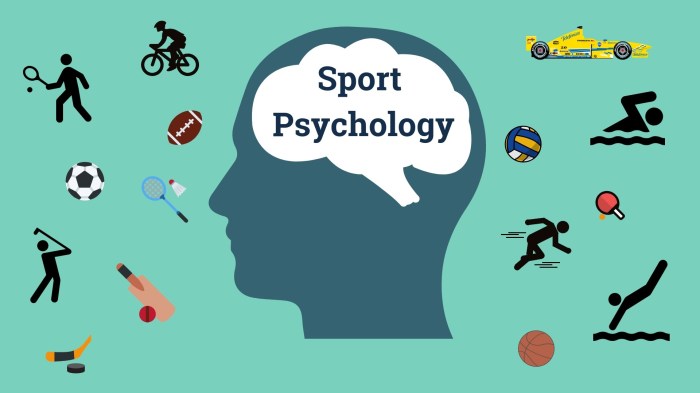Sports psychology is where it’s at, y’all! Get ready to dive into a world where mental skills meet athletic prowess, shaping champions and breaking barriers.
From visualizing success to mastering self-talk, this field is all about leveling up performance and crushing those mental blocks.
Introduction to Sports Psychology
Sports psychology is a field that focuses on the mental aspects of athletic performance. It involves understanding how psychological factors can impact an athlete’s performance and overall well-being.
By utilizing sports psychology techniques, athletes can enhance their focus, motivation, confidence, and resilience. This can lead to improved performance, better decision-making under pressure, and increased overall mental toughness.
Examples of Famous Athletes
- Michael Jordan: Known for his strong mental game and ability to perform under pressure, Jordan worked with sports psychologists to enhance his mental skills.
- Simone Biles: The Olympic gymnast has openly discussed how sports psychology has helped her overcome mental blocks and perform at her best.
- Serena Williams: A tennis legend, Williams has credited sports psychology for helping her stay mentally strong and focused during high-pressure matches.
Psychological Skills Training
Psychological skills training in sports psychology involves various techniques to enhance an athlete’s mental abilities and performance on the field.
Visualization
Visualization is a technique where athletes mentally rehearse their performance, imagining themselves successfully executing skills or achieving their goals. By visualizing success, athletes can improve their confidence and focus during actual competition.
Goal Setting
Goal setting involves athletes setting specific, measurable, achievable, relevant, and time-bound goals to work towards. By setting clear objectives, athletes can stay motivated, focused, and track their progress effectively.
Self-Talk
Self-talk refers to the internal dialogue athletes have with themselves. Positive self-talk can boost an athlete’s confidence, maintain focus, and regulate emotions during high-pressure situations. It involves using affirmations and constructive thoughts to enhance performance.
Improving Focus, Confidence, and Motivation
- Athletes can improve their focus by practicing mindfulness techniques, such as deep breathing exercises or meditation, to stay present and attentive during competition.
- Building confidence involves setting realistic goals, acknowledging past successes, and using positive self-talk to reinforce belief in one’s abilities.
- Motivation can be enhanced by setting both short-term and long-term goals, visualizing success, and maintaining a growth mindset to overcome challenges and setbacks.
Real-Life Impact of Psychological Skills Training, Sports psychology
In a competitive basketball game, a player who struggled with free throws implemented visualization techniques to mentally rehearse successful shots. As a result, the player’s free throw percentage significantly improved, showcasing the effectiveness of psychological skills training in enhancing performance.
The Role of a Sports Psychologist

Sports psychologists play a crucial role in helping athletes and teams enhance their mental skills to optimize performance. They work closely with individuals and groups to address various psychological aspects that can impact athletic success.
Responsibilities of a Sports Psychologist
- Providing mental skills training to athletes to help them develop focus, confidence, and motivation.
- Assessing and addressing psychological issues such as anxiety, stress, and performance pressure.
- Developing customized mental strategies to improve performance and overall well-being.
- Collaborating with coaches and other members of the sports team to create a supportive environment for athletes.
How Sports Psychologists Help
- Sports psychologists assist athletes in managing stress by teaching relaxation techniques and coping mechanisms.
- They help athletes address anxiety through cognitive-behavioral strategies and visualization techniques.
- By working on performance pressure, sports psychologists help athletes build mental toughness and resilience.
- They provide support and guidance during difficult times, helping athletes navigate challenges effectively.
Qualifications and Training
- To become a sports psychologist, one typically needs a graduate degree in sports psychology or a related field.
- Obtaining licensure or certification is often required to practice as a sports psychologist.
- Training programs focus on a combination of coursework, supervised experience, and practical training in sports psychology.
- Continuing education and staying updated on the latest research in sports psychology are essential for professionals in this field.
Mental Toughness and Resilience

When it comes to sports, mental toughness and resilience are key factors that can make a significant difference in an athlete’s performance. These attributes enable athletes to overcome challenges, setbacks, and pressure, ultimately helping them reach their full potential.
Strategies for Developing Mental Toughness
Developing mental toughness requires consistent effort and practice. Here are some strategies that can help athletes enhance their mental toughness:
- Set specific goals and work towards achieving them, focusing on the process rather than just the outcome.
- Stay positive and maintain a growth mindset, viewing failures as opportunities to learn and grow.
- Practice visualization and mental imagery to mentally prepare for competitions and challenges.
- Develop effective coping mechanisms to manage stress and pressure effectively.
Bouncing Back from Setbacks
Resilience is the ability to bounce back from setbacks, failures, and disappointments. Here are some ways athletes can build resilience:
- Accept that setbacks are a part of the journey and focus on what can be learned from them.
- Seek support from coaches, teammates, and sports psychologists to overcome challenges and setbacks.
- Practice self-care and prioritize mental well-being to maintain a positive outlook in the face of adversity.
The Game-Changing Impact of Mental Toughness
Mental toughness can be a game-changer in competitive sports, giving athletes the edge they need to outperform their opponents. Athletes with high levels of mental toughness are better equipped to handle pressure, setbacks, and challenges, ultimately leading to improved performance and success in their respective sports.